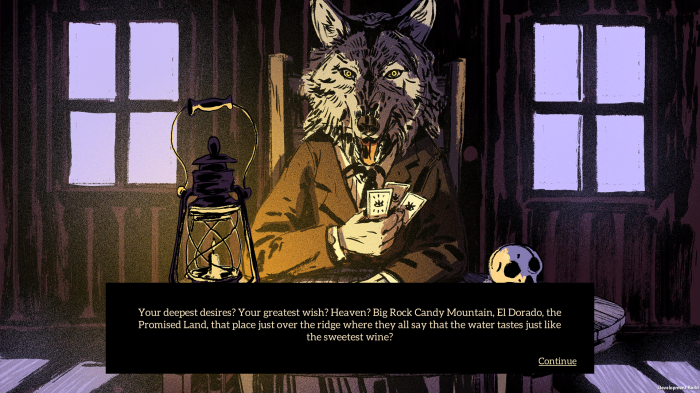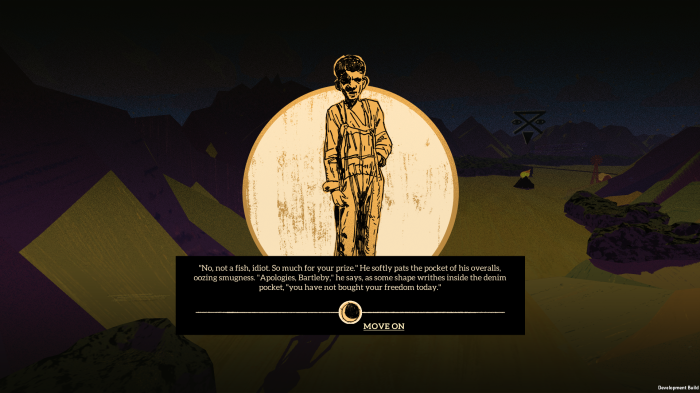On my way to Charlotte, I camped out with a man who walked with a crutch. We’d met on the road before, and he asked me to tell him a scary story to liven up the evening, so I told him about a strange, winged creature that I’d seen wandering the woods of New Jersey. He told me about his time in the war, and we parted ways. The next time I saw him was outside of Charleston, where he was literally tearing himself in two.
Where The Water Tastes Like Wine is a game about America, and its folk tales. On an even larger scale, it’s a game about the evolution of story: how a strange, lonely vagabond in a cave in Connecticut can become wound into an elaborate tale about a travelling hobo who walked the same 365 mile route year after year. Like any good story or joke, the folklore travels from state to state, being embellished and molded based on where it is told, or who is telling it. This topic is a fascinating one, and perfect for the medium of video games. Where The Water Tastes Like Wine is not a game for everyone, but those who are interested in Americana and tall tales are sure to find something genuinely intriguing about Good Shepherd Entertainment’s latest indie adventure.

In Where The Water Tastes Like Wine, you play a faceless collector of stories. Literally, though: you don’t have a face. In fact, you don’t have much of anything in terms of physical form. Instead, you’re a walking skeleton, who travels by foot, train, and even hitchhiking on his way across the United States of America. After a poker game gone awry, you’re challenged by a mysterious, wolf-faced figure to collect the folklore of the country, watching as it evolves and shifts. You’ll meet fellow travelers on your way, and the end of your long adventure depends on being able to learn the stories that shaped them, which you’ll report back to the Wolf.
The Wolf is also voiced by Sting, by the way: I’m not sure what, if any, significance that holds, but it’s a weird little tidbit in a weird little game.
As I said, your end goal is to meet a series of travelers who wander the same routes that you do, and to learn their own stories. The only way to do this is to tell them stories that suit their moods. Sometimes they want a happy story, sometimes they want a tragic one. And the only way to do that is to travel from town to town, city to city, meeting people, animals, and legendary forces of nature, and collecting their tales. As you continue your path, you’ll meet others who will tell you those same stories with new plot points or embellishments. As the stories evolve, they become more effective in bringing your traveling comrades out of their shells, so to speak.

I’ve seen a lot of games that are story focused or word heavy, but this is the first in recent memory that does such a good job of telling the story of… well, stories. Each story you collect is based on historic American folklore, from the Jersey Devil to the Native American legends of the Thunderbird. The oral tradition of passing stories along from generation to generation is intrinsically linked to the history of the US, and developers Dim Bulb Games and Serenity Forge have done a brilliant job of translating the importance of this folklore and its spread into game form.
Having said that, the game medium does have some weaknesses that the developers weren’t able to fully address. The first and most obvious to anyone who’s experienced this game comes from the traveling itself. You have to travel across the country in a game like this: it’s the only way the themes of Where The Water Tastes Like Wine make sense. However, the spaces between one story and another can be very long, and without a main road or a train to jump, you’ll find yourself walking, walking, walking across empty landscape for long stretches at a time. There’s a system in game where, by whistling, you can speed up a little bit, but it can be a little distracting, and it doesn’t really make you go that much faster. Perhaps the addition of random encounters in a “wandering monster” fashion would alleviate some of the boredom you can feel between towns, but as it stands, Where The Water Tastes Like Wine is full of long, slow moments where you’re not really doing much of anything except for moving forward and occasionally checking your map.

If you have to walk endlessly, however, you could do it to a worse soundtrack than this one. There are a lot of terrific tracks to listen to, all in that depression-era sound of folk and blues. Some of the songs, however, are a little over-produced. I’m not a music reviewer, but this game feels like it needs a soundtrack that feels as scratchy and worn as Oh Brother, Where Art Thou’s, and a few of the songs, while very well performed, are a touch too polished for the gritty, wandering theme that this game is going for.
Overall, however, I’d say that Where The Water Tastes Like Wine is a fascinating new game, with a subject that, despite its age, feels fresh and unique. There aren’t a lot of games out there like this, and that could mean you’ll love it, or be completely underwhelmed by it. My guess, however, is that if you are excited about the idea of folk stories, Americana, and wolves that sound like the lead singer of The Police, you’ll get something out of this. If, however, you can’t stand the notion of wandering the countryside aimlessly without a few orc bandits to slay, you might skip this one.
This review was based on complimentary code provided by the game’s publisher. Where The Water Tastes Like Wine is available on Steam for $19.99.


